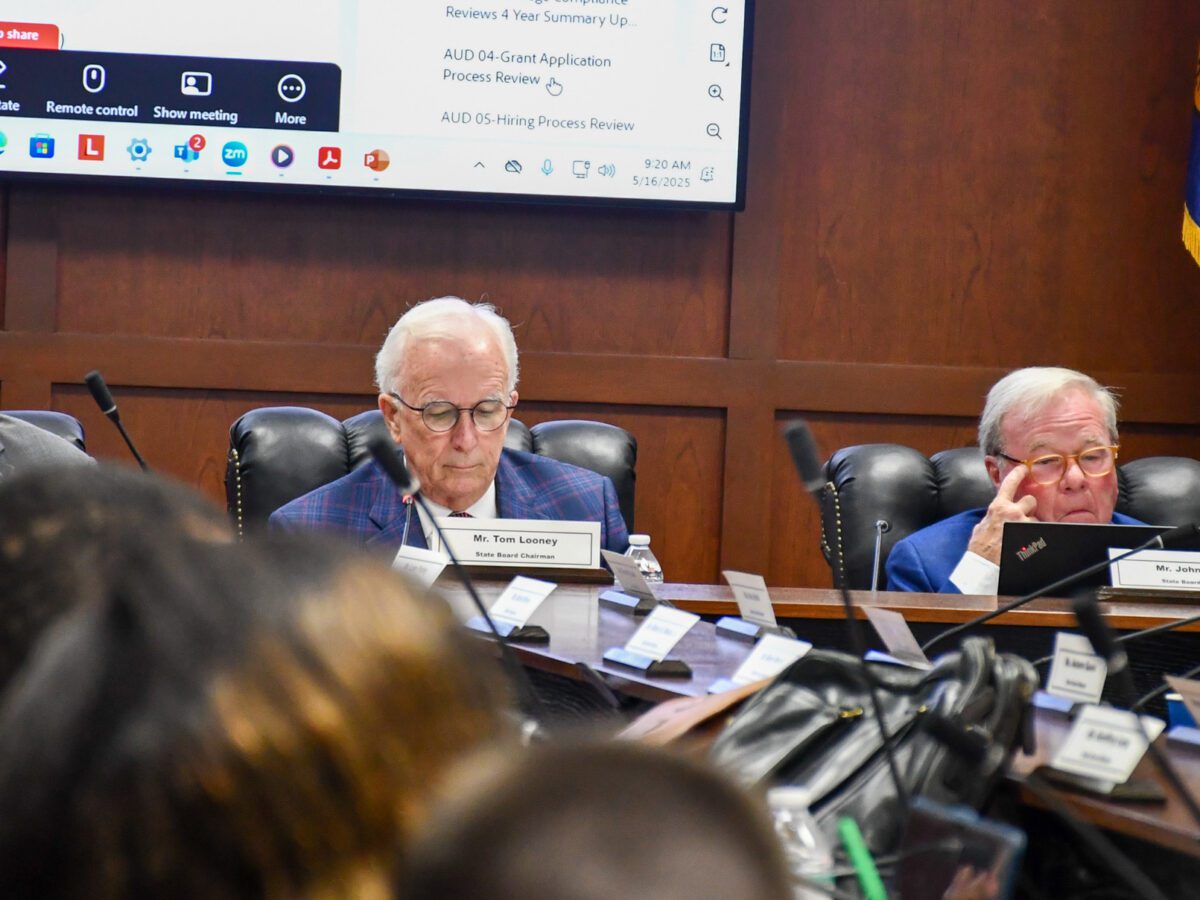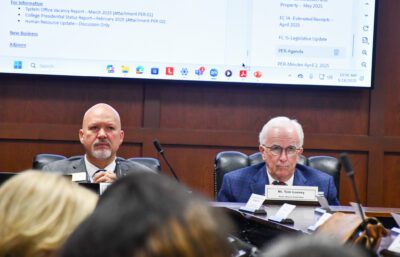
The State Board of Community Colleges met in July to discuss adult literacy programs, pilot programs, and competitive grants.
Three members were reappointed to the Board: John Kane, Geoffrey Lang, and Paula Benson.
The Board also swore in six new members:
- Stacy Griffin,
- Dr. David Lowry,
- Dr. Dale McInnis,
- Scott Ottman,
- Terry Yeargan, and
- Bannock Scott (Student Government Association).
July’s meeting was the last meeting for Coastal Carolina Community College President David Heatherly, as he ended his term as president of the North Carolina Association of Community College Presidents. Bladen Community College’s Dr. Amanda Lee will replace him.
“It is a very diverse system. I would only ask — and I believe that most of you believe as I do — that what we must do is make sure that we keep ‘community’ in our community colleges,” Heatherly said in his final remarks.
Tom Looney and John Kane were re-elected to serve as chair and vice chair of the Board, respectively.
![]() Sign up for Awake58, our newsletter on all things community college.
Sign up for Awake58, our newsletter on all things community college.
Board moves forward with multiple pilot programs
The Board approved $25,000 to support a pilot program expanding the criteria for 9th and 10th grade Career and College Promise students in CTE (career and technical education) pathways. The funds would give participating colleges $3,000-$5,000 to provide support in high-need areas such as textbook purchases and transportation. The pilot program was approved by the Board in May.
This funding would come from the Board Reserve Fund, which is money designated by law for “feasibility studies, pilot projects, start‑up of new programs, and innovative ideas.”
Also approved was $25,000 for an initiative to streamline the transfer process for students pursuing associate of applied science degrees. Lisa Estep, chair of the finance committee, said these degree programs weren’t originally designed to transfer, but data from the Belk Center shows that 20% of community college transfers to University of North Carolina institutions come from these programs.
Accelerate and Innovate McDowell is an initiative between the North Carolina Small Business Center and McDowell Technical Community College to promote small businesses and entrepreneurship in rural communities. According to the finance committee, McDowell Tech will serve as the pilot for the program before it is offered at all 58 community colleges. For McDowell specifically, these funds are intended to help small business owners impacted by Hurricane Helene. The Board approved $21,200 for the pilot.
The Board approved an extension of previously awarded High-Cost Health Care Workforce funds to continue supporting the implementation of new and existing programs in high-demand healthcare fields. The General Assembly initially appropriated $35 million in non-recurring funds to start up the health care workforce programs in 2023. Colleges requested the carry-forward of unused funding for the programs for several reasons, including delays related to procurement, instructor hiring, and program approvals.
The Board also approved an online adult high school initiative. The fully online program would be part of a regional consortium among Halifax Community College, Martin Community College, and Roanoke-Chowan Community College — all located in Tier 1 counties. According to Estep, colleges will pilot the program along with local education agencies, in hopes of eventually offering the program at all 58 community colleges. The Board approved a request for $225,000.
Courses will be offered synchronously and asynchronously in an effort to accommodate work schedules, child care needs, and transportation barriers. Ideally, once they earn their adult high school diploma, participants can begin earning stackable credentials — smaller credentials that build upon each other and can lead to a higher certificate or degree.
The Board approved several other items presented by the finance committee, including:
- $2,935,000 to be allocated for the Golden LEAF Community College Scholarship Program,
- $2,910,000 to 15 colleges for the Intellectual and Developmental Disabilities Training Program, and
- $1,500,000 to support the Finish Line Grants program.
Related reads



Updates on adult literacy
Dr. Robert Van Dyke, associate vice president for federal programs at the North Carolina Community Colleges System (NCCCS), said that 65,000 adult learners statewide were served through adult education and literacy programs in the state in 2024-25, which he said is an increase from 45,000. This year, students exceeded the state’s measurable skill gains target by nearly six percentage points, meaning more students are improving their reading, math, English, and career readiness.
The Board approved the reallocation of carryover Title II, Adult Education and Family Literacy Act funds for eligible providers in the final year of a four-year grant cycle. According to the finance committee, the $4.7 million will be used for adult education and literacy activities. These are federal dollars that weren’t spent in Fiscal Year 2024 and are being reallocated to fill a gap in funding after a federal freeze, currently being litigated.
The Board also approved a total of $400,000 in additional funds for Alamance Community College, Blue Ridge Community College, Pitt Community College, and Randolph Community College for the continuation of the Integrated Education and Training Project, which couples adult education and literacy activities with workforce preparation and training. Each of the four colleges exceeded the Measurable Skill Gains rate — used to assess student progress through academic levels and/or credentials gained — of 43.6% during the 2024-25 program year.
Rethinking the Board’s competitive grant strategy
The Finance Committee also heard an update on how NCCCS is approaching competitive grants.
According to Zachary Barricklow, assistant vice president for strategic and rural innovation, the NCCCS set a goal to apply for at least $10 million in competitive federal grants in June 2024. Barricklow said that the goal was met, but that some competitive federal grant programs are currently undergoing changes that may affect their structure and administration. Now, the NCCCS is shifting its grant strategy to account for those changes.
Moving forward, Barricklow said the goal is to apply for at least $15 million in grants and to secure at least 50% of the funds they apply for. He said the NCCCS is considering three options: Federal grants, which are considered a “stable and continuing” source, state grants that “have the potential to offset some of the lost federal funds and build braided funding models,” and private grants and funding from philanthropic foundations.
NCCCS Director of Grants Chanell Butler said the changing strategy is a response to changes coming at the federal level.
“There are so many different kinds of competitive grants we went for, but one or two or three of those competitive federal funding grants are either being considered still at the federal level, or they have been funder withdrawn,” Butler said.
Butler specifically mentioned a digital equity grant that NCCCS worked on for months that was never considered after submission because the federal government closed the program.
2025 performance measure report
The Board heard updates on the annual performance report for all 58 community colleges. The performance report assesses community colleges based on seven measures:
- Basic Skills Student Progress,
- Student Success Rate in College-Level English Courses,
- Student Success Rate in College-Level Math Courses,
- First Year Progression Baselines and Excellence Levels,
- Curriculum Student Completion,
- Licensure and Certification Passing Rate, and
- College Transfer Performance.
Here’s the performance data for each community college in the state. According to Dr. Bill Schneider, NCCCS vice president of system effectiveness, dually enrolled students are driving the success rates for the College Transfer Performance measure, with 72% enrolling at a four-year university after completing a two-year degree program.
Findings from digital credential pilot programs
In December 2024, the General Assembly appropriated up to $1 million in non-recurring funds to support a digital credential pilot program. Cape Fear Community College and Randolph Community College were selected as lead institutions for the pilot program.
Cape Fear Community College piloted an app called DigiCred, which allows students to securely store and share their transcripts and student IDs using a mobile wallet. Eighty-five percent of the Cape Fear Community College students, 86% of the New Hanover County Schools students, and 91% of Pender County Schools students downloaded the app. Over 2,500 transcripts and 2,150 student IDs were issued.
Randolph Community College partnered with an app called Certree to pilot a project focused on providing students with secure, digital access to transcripts, diplomas, certificates, and student ID records. According to a system report, more than 80 educational institutions and 40 government entities in North Carolina use Certree.
Dr. Andrew Gardner, associate vice president of workforce strategies at NCCCS, said the next step will be to evaluate which of the two applications is preferred, then determine how to prioritize digital credentials in its funding requests to the legislature.
“I think we’re trying to evaluate,” Gardner said. “We’ve gotta look at that and really measure that and decide where does that fit in our priorities that we’re going to try to elevate with overall system modernization and then seeking out those funds to implement these different platforms.”
Three fast-tracked programs
The Programs Committee also approved three curriculum programs to be fast-tracked for implementation:
- Rowan-Cabarrus Community College: Associate in Applied Science in Health Sciences, Fall 2025
- Tri-County Community College: Cardiovascular Sonography, Fall 2025
- Wake Technical Community College: Cardiovascular Sonography, Fall 2026
Presidential reappointments and NCCCS vacancies
The Board announced a new president, Dr. Kevin Lee, for Piedmont Community College. According to the college, Lee’s tenure as PCC’s president will start on Aug. 4.
The personnel committee also announced that a long-time vacancy — 372 days — had been filled, naming a new enterprise resource planning operations director. According to Board Personnel Committee Chair Bill McBrayer, the System Office vacancy rate has decreased to 5.74% — an improvement from a 20% vacancy rate in previous years. McBrayer said there are currently 13 vacancies at the system office.
The Board also approved 11 presidential reappointments.
- Dr. Mark Poarch – Caldwell Community College,
- Dr. Lisa Chapman – Central Carolina Community College,
- Dr. Ray Staats – Craven Community College,
- Dr. Greg McLeod – Edgecombe Community College,
- Dr. Patrena Benton Elliott – Halifax Community College,
- Dr. Shah Ardalan – Randolph Community College,
- Melissa Singler – Robeson Community College,
- Dr. Don Tomas – Southwestern Community College,
- Dr. Donna Tipton-Rogers – Tri-County Community College,
- Dr. Rachel Desmarais – Vance-Granville Community College, and
- Dr. Patricia Pfeiffer – Wayne Community College.
The full Board meets next Aug. 14-15.
Recommended reading



